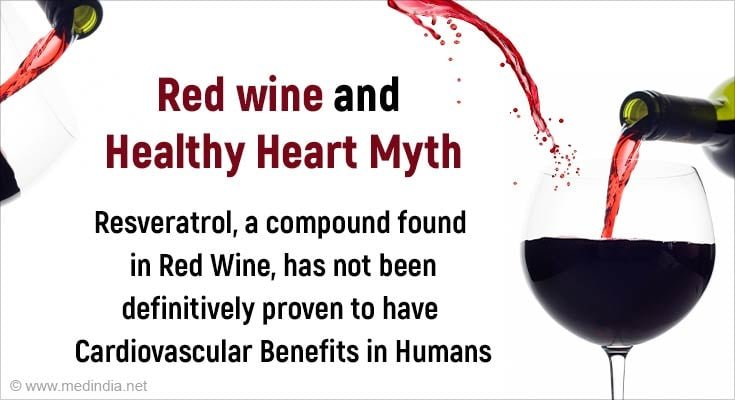Harmful to Heart as Any Other Alcohol

-
Research challenges the notion that red wine is essential for heart health, disputing the believed benefits of compounds like resveratrol - The traditional link lacks solid scientific evidence, emphasizing the importance of a holistic, healthy lifestyle
- Moderation in alcohol consumption remains crucial, with experts recommending limits associated with alcohol
For years, red wine has occupied a cherished place in the hearts of many enthusiasts, not only for its rich flavors but also due to the belief that it could serve as a secret weapon for maintaining a healthy heartThe prevailing idea was that compounds like resveratrol, abundant in red wine, might offer significant cardiovascular benefits.
However, recent research challenges this long-held belief, suggesting that red wine may not be as indispensable for heart health as once thought.
Advertisement
The Resveratrol Conundrum
The connection between moderate red wine consumption and a healthier heart was initially based on observational studies rather than concrete cause-and-effect evidence. Antioxidants, particularly resveratrol, found in red wine appeared promising for heart protection, but scientific evidence supporting these benefits remains inconclusive in human studies (1✔ ✔Trusted Source
Is red wine actually good for your heart?
).
Furthermore, the question of whether the amount of resveratrol in red wine is sufficient to make a tangible difference remains unanswered. Consuming excessive amounts of wine in pursuit of these supposed benefits may, in fact, pose more harm than good to the body.
Advertisement
Health Risks Associated with Alcohol Consumption
It’s important to recognize that consuming any type of alcohol, including red wine, carries inherent risks. Alcohol intake can adversely affect the liver, contributing to issues such as fatty liver disease and inflammation.
Additionally, alcohol can disrupt blood pressure levels , potentially leading to high blood pressure and irregular heartbeats. For individuals with pre-existing heart conditions, alcohol can prove toxic to heart cells and may even precipitate heart failure.
Contrary to the belief that red wine is a prerequisite for maintaining a healthy heart, emerging research suggests that similar benefits can be achieved through adopting a wholesome lifestyle.
A diet rich in fruits, vegetables, and whole grains, combined with regular exercise, sufficient sleep, and effective stress management, can work wonders for heart health without the need for alcohol consumption.
Advertisement
Moderation is the Key
For individuals with a history of alcohol-related problems, liver issues, or other health concerns, even minimal alcohol consumption may outweigh potential benefits. Health experts recommend that women limit their alcohol intake to one drink per day, while men should not exceed two drinks. Emphasizing moderation is crucial, but equally important is the focus on an overall healthy lifestyle, rather than relying solely on specific drinks for heart health.
While red wine has enjoyed a longstanding reputation as a heart-healthy beverage, recent research urges a reconsideration of its role in cardiovascular well-being. The traditional link between red wine and heart health, fueled by the presence of resveratrol, lacks robust scientific backing.
Instead of relying on specific drinks for heart health, individuals are encouraged to adopt a holistic approach by embracing a healthy lifestyle characterized by balanced nutrition, regular exercise, and stress management. As the landscape of health research evolves, it becomes increasingly clear that moderation and comprehensive well-being are key factors in promoting a healthy heart.
Reference:
- Is red wine actually good for your heart? – (https://www.health.harvard.edu/blog/is-red-wine-good-actually-for-your-heart-2018021913285)
Source-Medindia
Source link
#Harmful #Heart #Alcohol



